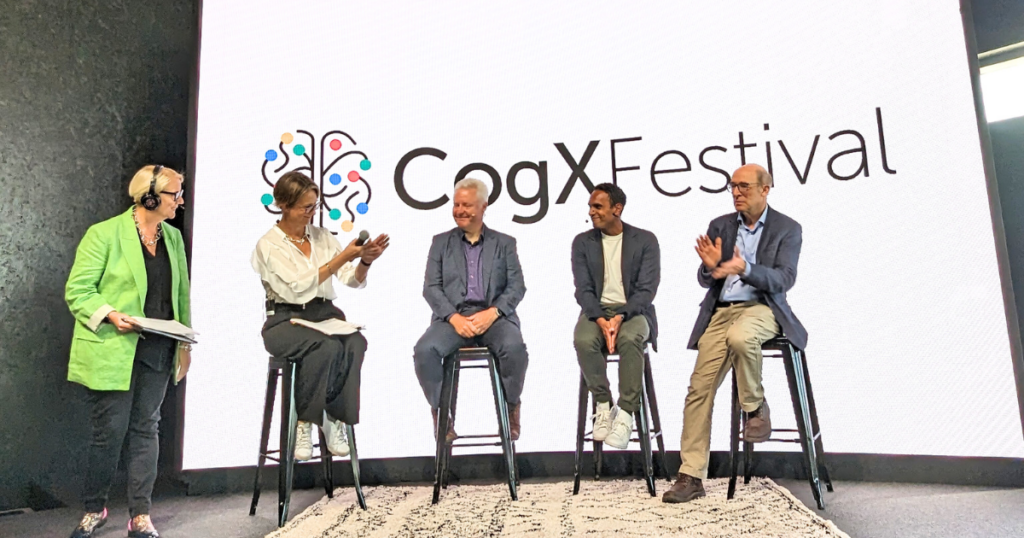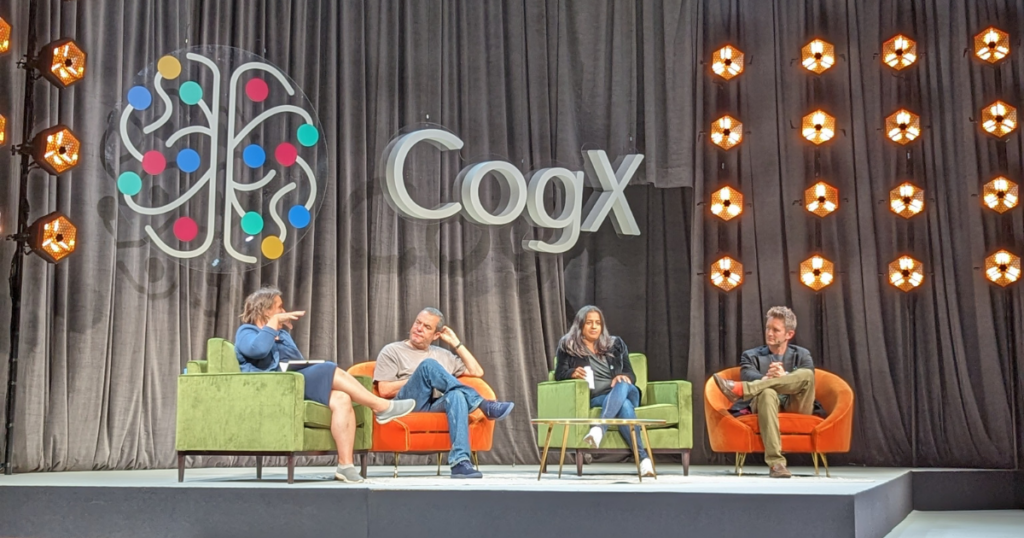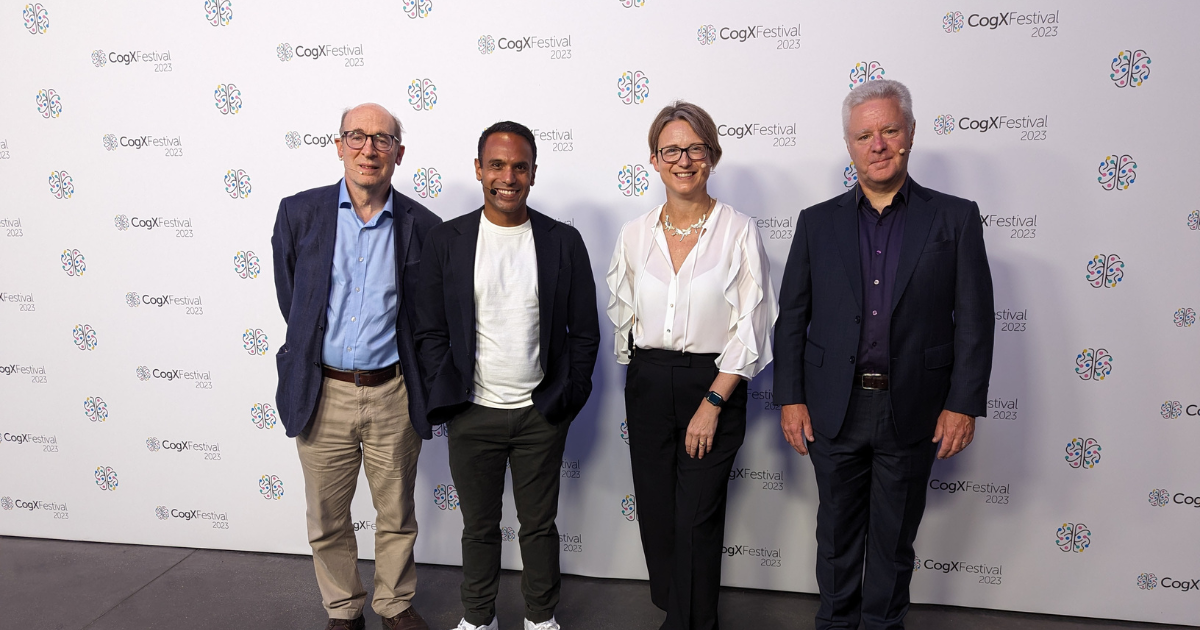Earlier this month Plexal hit the stage at CogX Festival, London’s festival of AI and transformational tech at the O2. The gathering included focus areas such as the Semi Impact Summit, which brought together some of the sharpest minds in the UK’s tech landscape to discuss the future of semiconductors “the building blocks of modern technology”. The Summit featured discussions on a range of topics, including the government’s semiconductor strategy, the challenges and opportunities facing the industry, and the importance of fostering innovation and technology in the country.
Plexal’s Chief Commercial Officer and Head of Innovation, Saj Huq, shared a stage, with moderator Suzanne Oliver, Director of IP Strategy at Scintilla, and fellow panel members Stephen Pattison, Head Global Public Affairs at Arm, and Charles Sturman, CEO at TechWorks. Together, they embarked on a compelling discussion titled “Blueprints of tomorrow: Charting the UK’s semiconductor future through government strategy.”
Semiconductors: the bedrock of technology
Saj set out an optimistic perspective for the semiconductor sector, highlighting its pivotal role in fostering broader tech growth. However, he also emphasised the importance of responsible development, cautioning against hasty endeavors that could inadvertently disrupt progress.
“Semiconductors underpin all key technologies and one of the five S&T priorities the government set out,” said Saj Huq, emphasising the centrality of semiconductors in the UK’s tech priorities. He went on to highlight, “The sector is worth over USD1 trillion so we punch above our weight as a country.”
The discussions revolved around the critical importance of getting the next ten years right for this trillion-dollar industry that underpins almost every aspect of modern life.
Stephen from ARM highlighted that the UK’s strategy is focused on specialised areas within the semiconductor industry where the UK can excel, not rivalling countries who are leaning heavily on the expensive high end chip manufacturing capability. The UK aim should be to make the UK have a seat at the table in terms of the global semiconductor supply chain. Stephen recommended areas to focus on such as design, prototyping and possibly advanced packaging as examples.
Advocating for startups and SMEs
Charles from TechWorks, who represents a network of 280 startup and SME companies in the UK semiconductor sector, spoke about the expertise in the UK. He emphasised the necessity of nurturing the ecosystem capable of specialised manufacturing and prototyping.
Charles urged the audience to understand the importance of supporting startups and SMEs to grow the sector in the UK and to welcome international companies to have a significant UK presence. He further suggested that the government needs to be patient because it will take a decade to build success and growth in this area.

Cause for optimism
Reflecting on the government’s semiconductor strategy, Saj said there was cause for optimism, saying, “This strategy knows that in the next 12-18 months, there will be political upheaval, but this is such a strategic sector that it needs to maintain focus.” He drew on his experience in national security, to link the government’s strategies across science and technology areas from semiconductors to space, from cyber and quantum to AI which all enable strategic advantage for the country in the long term.
The government cares and the public should care because there is societal impact. Stephen pointed out that “computing and programming are massive instruments for social mobility.” These technologies help remove barriers to entry and he shared a story about an ARM employee who left school at sixteen, initially learning to be a baker. Realising this wasn’t their skillset, they went to a further education college and took up computer programming which led to working at Intel and then eventually ARM who are one of the most sought after companies in the UK tech sector. Stephen urged the audience to consider how we can build a society where we are proud of, committed to, and focused on innovative technology, because “it can benefit a lot more people than you might think.”
Charles suggested that in order to make the semiconductor industry more appealing to young people like the one Stephen spoke about, we need to show the country why this technology is important through events and marketing. Saj also noted the importance of not using jargon which can alienate the vast majority and make the language we use relevant to everyone.
Tech optimism winning over the sceptics
The panelists all shared a strong conviction in the value of new technology and the importance of shaping the tech ecosystem to benefit society as a whole as well as creating strategic national advantage.
The AI Safety Summit in November is a key moment for technology as a whole in the country. Saj Huq highlighted the importance of international collaboration in the face of geopolitical challenges: “We need to work with international partners and facilitate the transfer of talent across centers of gravity in this space.”
Looking ahead
In summary, the UK’s semiconductor strategy represents a promising start, focusing on early-stage research and development. To thrive in this dynamic industry, the UK must find its niche, build a robust ecosystem, and nurture a skilled workforce. Collaboration, both domestically and internationally, will be vital in ensuring the UK maintains a competitive edge in this critical sector.
As the world continues to rely on semiconductors for innovation and progress, Plexal remains deeply committed to playing a significant role in shaping the future of technology in the UK.

The state of UK tech panel: Shaping the future
Plexal later listened in to another panel about the “State of UK Tech”, hosted by Maija Palmer, Editor at Global Corporate Venturing. The panel featured Reshma Sohoni, Managing Partner & Co-Founder at Seedcamp, Saul Klein, Founding Partner at LocalGlobe, and Stian Westlake, Executive Chair at ESRC: Economic and Social Research Council. These industry luminaries stressed the need to combine AI advances with a focus on safety, encouraging innovators to delve into the UK Science and Technology Framework. They advocated for a stronger commitment to building affordable housing in tech hubs like Cambridge, fostering a physical ecosystem that nurtures both technological innovation and community development.
Regulating pandora’s box: AI governance in focus
And the third session Plexal’s team enjoyed was a panel session delving into the complex realm of AI governance: “Regulating pandora’s box: How can government keep up with the pace of AI?”
Moderated by Dan Milmo, Global Technology Editor at The Guardian, the panel featured notable speakers such as Didi Denham, AI policy lead at Google, Karen Silverman, CEO and Founder at The Cantellus Group, and Irakli Beridze, Head of Centre for Artificial Intelligence and Robotics at UNICRI – United Nations Interregional Crime and Justice Research Institute. The discussion centered on the challenges governments face in regulating the rapid advancement of AI. The panelists underscored the importance of accelerated cooperation between academia, innovators, and industry in crafting a multi-layered AI governance framework. They emphasised the need for flexibility, recognising that AI progress will vary across organisations, industries, and available resources. The goal: mitigating risks while harnessing the immense benefits of AI.
Saj reflected after CogX about the role Plexal can play in the UK tech ecosystem, supporting startups working on breakthrough technology, and supporting UK Government with regulation to enable rapid and safe deployment. More to come soon on that!
A flavour of CogX Festival
We extend our gratitude to Joe Watson and the entire CogX team for inviting us to this thought-provoking event. We look forward to rejoining the discourse next year!
As Plexal remains deeply embedded in the semiconductor sector, we are committed to playing a pivotal role in the growth of UK tech, ensuring that it evolves responsibly and sustainably, just as our CCO Saj emphasised on the Semi Impact Summit stage.
Stay tuned for more updates on our journey at the intersection of technology and innovation: subscribe to our innovation newsletter.


